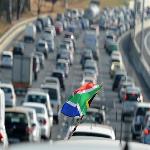29 June 2010

Photo: AFP
Traffic moves slowly near Soccer City Stadium in Johannesburg on the opening day of the 2010 World Cup football tournament in South Africa, 11 Jun 2010
Johannesburg is unique at the 2010 World Cup in that it is the only one of the nine host cities that is staging games in two different stadiums. It is the largest city in South Africa, with a population of about 7 million, including its suburbs.
The older downtown stadium, Ellis Park, seats about 62,000, while the new Soccer City Stadium in the suburbs, where the final will be played, is much larger, holding about 90,000 fans. Like any big sporting event, it is always a challenge to get fans in and out of the stadiums in an orderly and efficient manner.
South African World Cup organizers have been asking everyone to allow plenty of time and, if possible, take public transportation to prevent huge traffic jams and avoid the missing kick-offs.
Johannesburg resident Guy Williams said it has taken a different mindset for the locals.

Parke Brewer, VOA
Guy and Sheryl Williams are enjoying the new experience of using public transportation in Johannesburg"I think people have gotten the message now; 'Leave early, get there early.' As South Africans we're used to going very, very late and arriving basically at kick-off time," said Williams. "And this going early is a bit alien to what we're used to, so I think the message has gotten through."
Williams is from Liverpool, England, but has lived and worked in Johannesburg for 33 years. Neither he nor his South African wife Sheryl, had ever ridden a local train until this World Cup. They decided to ride it to Soccer City Stadium.
"We were advised by lots of people that the only way to go to the event was to go by train, because the parking facilities close to the stadium were a bit of a mess," added Williams. "And the park-and-ride facilities and the buses were busy, and the train was going to be the easiest, most convenient route. And so it's worked out so far."
His wife Sheryl agreed.
"It's great! It's fantastic! It's got a vibe and it's great to do," she said.
And so why haven't Guy and Sheryl ridden the locals rails before now? He says they are like nearly all citizens in the country who own cars.
"Security issues. We are very concerned about public transport in South Africa. Public transport is not the norm. People don't think in terms of public transport. It's your motorcar first, your motorcar second, and public transport is not something we ever consider using," he explained.
Guy Williams said it is not a black and white issue. He attended a match in Pretoria with a friend who is black. Williams suggested they drive to the park-and-ride facility and take the bus to the stadium.
"And he said, 'Absolutely not. I've got a motorcar, and I will use my motorcar,'" he said. "'The poor people of South Africa can use public transport. I will not!' he said, 'We have motorcars, we use them. If we don't have motorcars, we use public transport,'" recalled Williams.
Williams has enjoyed the matches he has attended and shared some of his thoughts on how things might be in South Africa once the World Cup is over and all the visitors have left.
"I think most of us, in the back of our mind, have got this issue about what is the legacy going to be and what it's going to cost us and how we're going to pay for it over time," he said. "But certainly in the short term, we're prepared to forget all about that and have a good time and make sure our visitors have got unbelievable hospitality, looking after our visitors, making sure they have a great experience. And certainly in terms of nation-building, this is crucially important."
Williams added that from all his fellow South Africans he has spoken to, the World Cup has been a bonding experience, and they all hope the foreigners who have come to take in the games and the culture will be glad they traveled here.
"It's real people who are spending their own money. And have they had a good time? And what are they going to go and say when they meet their friends and family and workmates when they go home? What are they going to say about South Africa? And it's a common theme for all of us - black, whites, colored, Indian in South Africa - that we want everybody to go back and tell them we're actually okay, and it's a great place to visit, and they've enjoyed themselves," he added.
And Guy Williams might even suggest they try riding the local trains.